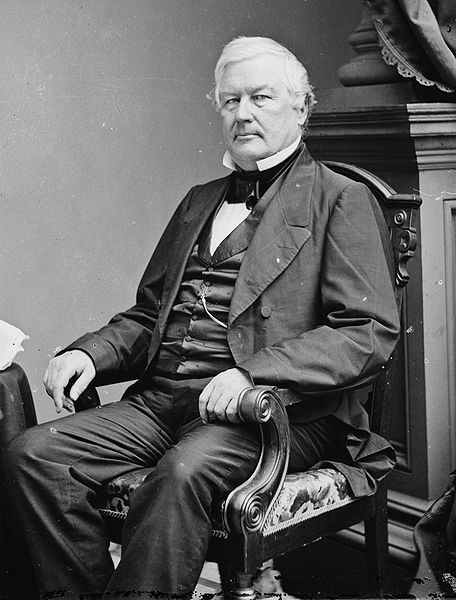
Millard Fillmore was the 13th president of the United States and one of the lesser known president. One interesting fact about this man is that he was the last president in the Whig party to be elected. After him, we have only had Democrats and Republicans. Another interesting fact, which is in the article, is that he was against slavery. He would not support adding Texas to the United States unless they gave up slavery.
This newspaper article was published in 1874, the year former President Fillmore passed away.

Death of Ex-President Millard Fillmore
Ex-President Millard Fillmore, died at his residence in the city of Buffalo, N.Y., on Sunday evening last, the 8th inst., at ten minutes past 11 o’clock. At 8 o’clock, in reply to a question by his physician, he said the nourishment was palatable. These were his last words. He was conscious up to the time of his death, which was painless.
Millard Fillmore was born at Locke, now Summerhill, Cayuga county, N.Y., Jan. 7, 1800. His father, Nathaniel Fillmore, was of English descent, and followed the occupation of a farmer. He removed to Erie county in 1819, and cultivated a small farm.
At an early age Millard was sent to Livingston county to learn the clothier’s trade, and passed four years in dressing cloth. During this time he improved every spare hour to supply the defects of his early education.
In 1819, he made the acquaintance of the late Judge Wood of Cayuga county, and entered his office for the purpose of studying law. In order to do this he had to pay $30 for one year’s time which he owed his employers. To raise this sum he devoted his spare time to teaching school.
By working from four in the morning until late at night he accomplished the desired result, paid his debt, and had $6 left for expenses for the whole year. His board cost him nothing.
In 1829 he was elected to represent the county of Erie in the State Assembly. Being a member of the old Whig part, which was at that time in the minority, he had little opportunity of distinguishing himself. His humanity and love of justice, however, led him to take an active part in the movement for abolishing imprisonment for debt in the State.
In 1832 he was elected on the anti-Jackson ticket to Congress, serving one term. In 1837 he was again chosen as a Whig, and also in 1838 and 1840. He was again nominated in 1842, but peremptorily declined. While in Congress he declared himself opposed to the annexation of Texas so long as slaves were held therein, and in favor of Congress exercising all constitutional powers to abolish the slave trade between the States and the slave trade in the District of Columbia.
In 1830, at the opening of the Twenty-sixth Congress, he took part in the celebrated “broad seal” contest on the right to the seats of five of the six members from New Jersey, and was one of the Committee on Elections making a minority report on the subject. In 1848 he was elected Vice-President of the United States and became President July 10, 1850, on the death of General Taylor, and that year signed the Fugitive Slave law and the accompanying bills known as the “Compromise Measures.” In 1857 he put in force the Neutrality laws against the Lopez filibusters, removing the Collector of New Orleans, by whose connivance the Pampero escaped from that port.
In 1852, his wife, formerly a Miss Abigail Powers, daughter of the Rev. Lemuel Powers, died leaving him two children, a son and a daughter, the latter of whom died in 1854.In 1855 and 1856 he visited Europe, where he was received with the most flattering attentions. The same year he was nominated by the Americans for the Presidency, but received only the vote of Maryland in the Electoral College.
Feb. 10, 1858, he married Mrs. C. McIntosh, daughter of the late Charles Carmichael of Morristown, N.J., and has ever since lived in quiet retirement at Buffalo, devoting himself to literary pursuits, and particularly to the Historical Society, of which he was first President, and in whose affairs he had taken great interest.
In 1861 when the news was received of the firing on Fort Sumter, he presided at the first meeting held in the theatre to express the loyal sentiments of the community. He also helped to organize the Union Continentals, a home guard organization, and was long its captain. [Source]

